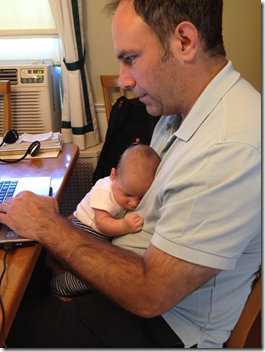Matthew Dicks's Blog, page 529
July 10, 2012
Wedding reboot: Forgot the ring
My wife and I will be celebrating our sixth wedding anniversary later this month. Following our wedding, I wrote about some of the more memorable moments and posted them on a blog that no long exists.
As our anniversary approaches, I’ve decided to re-post some of those wedding memories here as a means of preserving them as well as sharing them with readers.
Here is the next of these posts:
__________________________________________
It’s 6:49 and I was sitting in the Bradley Airport terminal, headphones on my head, listening to music through my laptop and playing poker online. Elysha and I were less than 48 hours married when she came running up to me from the direction of the restrooms.
“Did you hear? They just paged you at security.”
I had not heard the page but knew exactly what was going on.
Our friend Tom and Liz had arrived at our apartment earlier that morning, armed with a coffee for Elysha and a pair of smiles, ready to take us to the airport.
It was 4:45 and they were the only two smiling. Elysha and I had gone to bed about three hours prior to their arrival.
Why pack ahead of time, right?
About fifteen minutes from the airport, while sitting beside my bride in the backseat of Tom’s truck, I gasped in horror, realizing that I had left my newly-christened wedding band on my desk at home. After enduring the angry glare of Elysha, Tom and Liz (in an effort to save my marriage) agreed to return to our house, pick up the ring, and ship it overnight to Bermuda.
Less than an hour later, Tom had arrived at the security checkpoint with my wedding band in hand and another smile on his face. A door was cracked open by airport security personnel and Tom was allowed to pass his hand through in order to give me the ring.
As we were walking back to our gate, Elysha said, “Tom and Liz are two of our nicest friends.”
It’s true. We have a great many wonderful friends in our lives, and many of them would have been more than willing to pick us up this morning, and most would have gone the extra mile (about 30 miles actually) to save my ass by delivering my wedding band just moments before I needed to board the plane.
But Tom and Liz routinely do these things without complaint.
Without grumble.
Without looking for anything in return.
It makes them an odd and baffling pair of friends, and we sometimes wonder if they originated from some other planet, but it also makes them two of the nicest friends we have.
I have never
I am a constant advocate of trying new things and “putting yourself out there” but I also have an “I have never” list that I am quite proud of (though it might also make me seem like a bit of a square).
I have never:
Entered a strip club
Taken a mulligan while playing golf
Experimented or used an illegal drug of any kind
Smoked tobacco of any kind
Have a list of your own that you’d care to share?
Super secret time travel for the purposes of behavior management
I took this picture of my daughter walking past this particular car in order to convince her at some point in the future that the photograph was taken in the late 1970’s.
“Time travel, Clara! Daddy is capable of time travel! So do you’re homework, damn it, or I’ll send you back to 1987 when Rick Astley’s music wasn’t ironic but was actually taken seriously. Think about it! ”
July 9, 2012
Wedding reboot: Wedding response runner-up
My wife and I will be celebrating our sixth wedding anniversary later this month. Following our wedding, I wrote about some of the more memorable moments and posted them on a blog that no long exists.
As our anniversary approaches, I’ve decided to re-post some of those wedding memories here as a means of preserving them as well as sharing them with readers.
Here is the next of these posts:
__________________________________________
A few days ago I posted the best response card that we received for our wedding.
Here’s the runner-up:
Can you see how they responded to us? Look closely.
Pretty clever. Not as good as a Dickens reference, but a strong second place.
And no, we didn’t honor their food request either.
Men want it all, too, damn it.
I was listening to the most recent Slate Double X podcast and nearly losing my mind. The panelists were discussing the recent Atlantic cover story Why Women Still Can’t Have It All with the author, Anne Marie Slaughter.
I read the piece a couple days ago and had been formulating my somewhat annoyed reaction to it when this podcast came on, which served to further annoyed me.
My basic argument with the piece is this:
Men want it all, too, goddamn it. I don’t know a father who doesn’t want to spend more time with his children. Not one. Nor do I know a man who doesn’t want to be immensely successful in his career. We all want it all.
So why the hell is this framed as a woman’s issue?
Why isn’t the piece titled Why Americans Still Can’t Have It All?
Or Why Human Beings Still Can’t Have It All?
And please don’t try to tell me that Slaughter’s cursory acknowledgements that this might be a man’s issue as well in any way minimizes the fact that this is a piece about women.
The title alone invalidates that argument. And the first two times that Slaughter acknowledges that this could also be a man’s problem, she does so parenthetically.
As I was pondering this annoyance, I started listening to Slaughter speak on the issue. The whole segment had me yelling back at the panelists, but two statements in particular, the first by Slaughter and the second by podcast host Noreen Malone sent me over the edge.
First, Slaughter:
We can say, for many women, that tug of having a child who needs you or a child you want to be with versus the demands of a workplace are felt more keenly for a woman. So that women, even when they know there is someone is taking care of their children, whether it be a nanny or a father, feel like I must be there, I need to be there and I want to be there. I don’t think we should apologize for it.
For anyone who wants to tell me that Slaughter is framing this as a human issue rather than a woman’s issue, this statement should end that discussion. Slaughter states in no uncertain terms that the female struggle is different because of their innate ability to sense the problem more keenly. It’s apparently some form of female extrasensory perception that not only allows women to perceive these struggles with greater sensitivity but also allows them to presume that they know how men feel about the issue as well. It’s a super-power of sorts which also results in their inability to fully trust a father with the care and wellbeing of a child.
And she makes it clear that she does not apologize for it one bit, either. If Spider-Man can detect eminent danger with his spider-like powers, there is nothing wrong with a mother’s ability to more keenly understand the nuances involved with having to leave your child in daycare or with a nanny in order to earn a living.
From a male perspective, this is nonsense. It’s offensive, condescending, presumptuous, narrow-minded and stupid. And yes, Anne Marie, you should apologize for it.
Next up is panelist Noreen Malone:
A lot of us co-parent with our husbands, and both have same track careers so the responsibilities are divided evenly, but yes, I think there is a maternal pull and I think there’s a pull for kids. There are certain times in their lives when kids need their moms more than their dads. I think that’s true.
Look! Another female super power, and this time it’s given a name.
The Maternal Pull.
“Yes, Dad, I know that you desperately want to spend more time with your children and might even be willing to sacrifice aspects of your career in order to do so, but I have The Maternal Pull. As much as you might want to stay home with the kids and volunteer at school’s ice cream socials, I want it more. Sorry, but there’s a reason it’s not called The Paternal Pull. It’s innate. It comes with the vagina.”
“Oh, and one more thing. I’m sorry to report that there are times when the kids are also going to require my love more than yours. My love is just more special than anything you are capable of offering. Sorry, Dad. Oh, and sorry to all the gay fathers out there, too. None of you have vaginas, so your kids are screwed.”
Try to imagine a man attempting to argue that a father’s need to be with his children is innately stronger than that of a woman, and as a result, fathers are naturally more conflicted than mothers when it comes to balancing careers and parenting.
How might women react?
Or that there are times in a child’s life when kids need their father more than their mother, because let’s be clear:
Malone does not say that there are times when children need their mothers or their fathers more. “There are certain times in their lives when kids need their moms more than their dads.” She makes no attempt to qualify her statement by stating that this need works both ways.
Even if she did, what about all the same-sex households out there. Does Malone really believe that the children of lesbian mothers and gay fathers are all doomed?
And lest you think that my quibbles with the podcast do not address the actual piece, it is also littered with similar statements.
Like this one:
What’s more, among those who have made it to the top, a balanced life still is more elusive for women than it is for men. A simple measure is how many women in top positions have children compared with their male colleagues. Every male Supreme Court justice has a family. Two of the three female justices are single with no children. And the third, Ruth Bader Ginsburg, began her career as a judge only when her younger child was almost grown. The pattern is the same at the National Security Council: Condoleezza Rice, the first and only woman national-security adviser, is also the only national-security adviser since the 1950s not to have a family.
In this paragraph, Slaughter attempts to argue that because the male Supreme Court justices have families, their lives are inherently more balanced than the two female justices without children.
She’s right to acknowledge that this is a “simple measure.” Perhaps more accurately it should be called a “simpleton’s measure.”
Slaughter has no clue about how much time these male justices spend with their wives and children. She assumes that because one person has kids and the other does not, the person with children has a more balanced life,
C’mon. Even the most ardent Slaughter supporter has to admit that this is a stupid assumption to make.
Even worse, it completely discounts the possibility that Elena Kagan, Sonia Sotomayor, and Condoleezza Rice simply have no interest in children and implies that anyone who does not have a family does not have a balanced life.
Am I to believe that these three high ranking women yearn for a more traditional American family, and it has only been their climb to the top that has prevented them from having rug rats running around their homes?
It’s possible, but Slaughter offers no evidence and seems to undermine the choice to not have a family in the process.
Here’s another:
Still, the proposition that women can have high-powered careers as long as their husbands or partners are willing to share the parenting load equally (or disproportionately) assumes that most women will feel as comfortable as men do about being away from their children, as long as their partner is home with them. In my experience, that is simply not the case.
Here Slaughter is assuming, once again, that she has a direct path into the male psyche and can easily ascertain the level of comfort that men feel about being away from their children.
This is narrow-minded and stupid. With the differences in the ways in which men and women communicate, is it possible that Slaughter might not be fully in touch with how men feel about leaving their children, or could she be overly-generalizing the feelings of the men who she knows?
I think so.
A wise man never presumes to know what a woman is thinking or feeling, and Slaughter should be smart enough to do the same, or at least present some actual data supporting her anecdotal and meaningless conclusions.
One more:
Here I step onto treacherous ground, mined with stereotypes. From years of conversations and observations, however, I’ve come to believe that men and women respond quite differently when problems at home force them to recognize that their absence is hurting a child, or at least that their presence would likely help. I do not believe fathers love their children any less than mothers do, but men do seem more likely to choose their job at a cost to their family, while women seem more likely to choose their family at a cost to their job.
This is the most damning of her statements.
First, let’s be clear: Acknowledging that you’re about to apply stereotypes to half the population of the planet does not make doing so any better.
Second, stereotyping men and women based upon “years of conversations and observations” assumes, once again, that she can readily ascertain a man’s feelings based upon what he says and does.
Sorry, but this is never the case. Had Slaughter presented us with actual data, her argument might carry some weight. But to simply assume the mental framework of all of mankind based upon anecdotal observations is foolish.
Even better, she opens the door for me to counter with my own stereotypes (which I may or may not believe):
Perhaps men are more likely to choose job over family because they are more rationale and less emotional and understand that certain practicalities, like food and clothing, comes before any emotional need.
Maybe men are simply less selfish than women and are therefore willing to make greater sacrifices for their spouses.
Maybe men understand that feeding and housing and providing medical care for a family is a significant expression of love that does not require anything in return.
Maybe men simply know that trying to have it all is a ridiculous notion and therefore opt not to whine about it.
Perhaps a majority of men yearn to spend more time with their children but know that doing so might require their wives to spend less time, and that this would not sit well with the wife or society in general. Perhaps Thoreau was right: Most men live lives of quiet desperation, while a woman like Slaughter presume to know better.
Do these prices make any sense to you?
Look at the prices on this dessert menu. Do they strike you as bizarre?
For example, we ordered the strawberry shortcake, but we could’ve saved 14 cents by ordering the Pond House Oreo instead.
I’m sure there is a perfectly good reason why the shortcake cost 14 cents more.
It’s 14 cents better. Or it contains 14 cents worth of additional ingredients.
Right?
July 8, 2012
Wedding reboot: Nana recommends pole dancing
My wife and I will be celebrating our sixth wedding anniversary later this month. Following our wedding, I wrote about some of the more memorable moments and posted them on a blog that no long exists.
As our anniversary approaches, I’ve decided to re-post some of those wedding memories here as a means of preserving them as well as sharing them with readers.
Here is the fourth of these posts:
__________________________________________
On the morning following our wedding, Elysha was packing up in our room with the help of her grandmother. While Edith was sitting on the bed, she noticed the four poles at each of the corners of our bed and suggested to Elysha (and then to me once I came in) that we install a pole in our bedroom so that Elysha could perform for me each evening.
“So Nana, you think I should go to work, come home, make dinner, do a little school work, then do a pole dance for Matt every night?”
“That would be sexy,” she replied.
It’s not that I disagree. It’s just an unusual remark to hear from your wife’s grandmother, particularly less than twenty-four hours into our marriage.
Our little reader
My daughter reads WAY OUT IN THE DESERT while in her crib.
Recites it, really. I love the way she says the Spanish names.
These are the videos that I will always cherish most.
July 7, 2012
Darth Vader would never have allowed such a cheap shot
It’s rare when two individually outstanding creations can be brought together so seamlessly to produce something as near-perfect as this:
Team effort
When you read my next book, actually my next next book, know that a lot of it was written like this:







